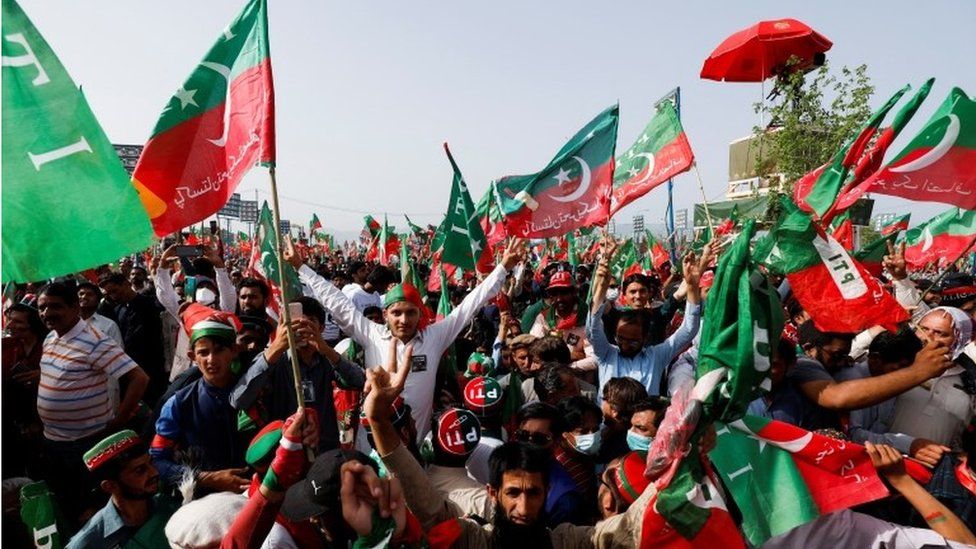After unprecedented twists and turns in the political drama in Pakistan, the fate of the Imran Khan government was finally sealed April 9 when he was deposed by a no-confidence vote in Parliament, days after he had blocked a similar attempt. Democracy has not been able to take firm roots in Pakistan due to the manipulations of a proactive military establishment that has far too often interfered with the democratic process. Fortunately for the people of Pakistan this time around, the Supreme Court set right an undemocratic and unconstitutional act of the elected government run by Khan and ordered the no-confidence motion be held. For the first time in the history of Pakistan, a Prime Minister was overthrown through a democratic, constitutional exercise. No Pakistani Prime Minister has ever completed a five-year term in office in the country’s 75-year history. Khan had prevented the no-confidence motion from being taken up, got the Parliament dissolved and had set the stage for fresh elections, denying the Opposition an opportunity accorded by the country’s Constitution to try and form a government a year before the present term was to be over.
The no-confidence motion required 172 votes in the 342-seat Parliament to pass. It had become clear Khan would not be able to muster the number as apart from his allies, 20 legislators of his own party, Tehreek-e-Insaf, had spelt out their plan not to support him. Eventually, the motion was supported by 174 legislators. Anticipating his loss, Khan had called on his supporters to stage rallies nationwide April 10. He had alleged the Opposition colluded with the United States to unseat him. After his defeat in the Parliament he hardly had any option other than keeping the momentum of street protests to pressure the Parliament to hold early elections.
To keep up the democratic spirit, Pakistan Opposition leader Shehbaz Sharif said after the no-confidence vote, “We will not seek revenge. We will not put people in jails, but the law will take its course.” It is widely expected that Sharif, who is the younger brother of former three-time Prime Minister Nawaz Sharif, is going to replace Khan in the next few days.
Khan had played the victim card by alleging that foreign powers, meaning the US, had hatched a conspiracy to oust him as he had embarked on a foreign policy independent of the US, embracing China and Russia as Pakistan’s dependable allies. In fact, he had visited the two countries in the past few months to cement further Pakistan’s ties with them. He also incurred the wrath of the West by not denouncing Russia’s invasion of Ukraine and lending tacit support to it. He tried to drum up people’s support by giving a back-handed compliment to Indian democracy which he said is so firmly entrenched that no power can force it to change its independent foreign policy “as is being done in the case of Pakistan.”
The next Prime Minister of Pakistan will have to handle the same issues that bedevilled Khan. The challenges facing the country both internally and externally are enormous. The Opposition has alleged that the collapse of governance is so complete that it will be a herculean task “to stem the rot.” A poorly performing economy, attacks by armed groups and shaky relations with former allies will top the agenda for the next administration. Crippling debt, galloping inflation and a feeble currency have contributed to stagnant growth for the past three years with little prospect of improvement. Pakistan watchers say radical policy reforms are needed to turn around the economy. The Khan government is perceived to have failed to revive an economy battered by COVID-19 or fulfill promises to make Pakistan corruption free.
Corruption has been endemic in Pakistan and the current president of the Pakistan People’s Party, Asif Ali Zardari, who was once President of Pakistan, was in the past accused of indulging in corruption, cronyism and political vendetta. The PPP is going to be part of the new government that will take shape. A stupendous task is ahead of Pakistan’s political establishment if it wants to shake off the tag of a failed state, put democracy on a firm footing and stop the military from dictating terms to an elected government as it has hitherto been doing.
The big question is whether the intent of the people is strong enough to bring about these huge changes or not. But then, also, do the people have any choices that they can exercise?
